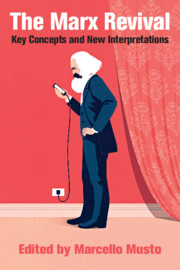Book contents
- The Marx Revival
- The Marx Revival
- Copyright page
- Contents
- About the Editor
- Contributors
- Preface
- Acknowledgements
- Note on the Text
- 1 Capitalism
- 2 Communism
- 3 Democracy
- 4 Proletariat
- 5 Class Struggle
- 6 Political Organization
- 7 Revolution
- 8 Work
- 9 Capital and Temporality
- 10 Ecology
- 11 Gender Equality
- 12 Nationalism and Ethnicity
- 13 Migration
- 14 Colonialism
- 15 State
- 16 Globalization
- 17 War and International Relations
- 18 Religion
- 19 Education
- 20 Art
- 21 Technology and Science
- 22 Marxisms
- Index
- References
17 - War and International Relations
Published online by Cambridge University Press: 29 May 2020
- The Marx Revival
- The Marx Revival
- Copyright page
- Contents
- About the Editor
- Contributors
- Preface
- Acknowledgements
- Note on the Text
- 1 Capitalism
- 2 Communism
- 3 Democracy
- 4 Proletariat
- 5 Class Struggle
- 6 Political Organization
- 7 Revolution
- 8 Work
- 9 Capital and Temporality
- 10 Ecology
- 11 Gender Equality
- 12 Nationalism and Ethnicity
- 13 Migration
- 14 Colonialism
- 15 State
- 16 Globalization
- 17 War and International Relations
- 18 Religion
- 19 Education
- 20 Art
- 21 Technology and Science
- 22 Marxisms
- Index
- References
Summary
In his 1846 letter to Pavel Annenkov (1813–87), Karl Marx asked whether ‘the whole organization of nations, and all their international relations’ was ‘anything else than the expression of a particular division of labour. And must not these change when the division of labour changes?’1 Commenting on the Crimean War a few years later, he noted in a 1853 letter to Friedrich Engels that ‘we had given the issue of foreign policy insufficient attention’.2 And in his 1877 letter to editor of the Otecestvenniye Zapisky, Marx objected to reading his historical account of the genesis of capitalism in Western Europe as a supra-historical philosophical theory, ‘fatally imposed upon all peoples, whatever the historical circumstances in which they find themselves placed’.3 This brief selection of quotes indicates an evolution, however unsystematic, in Marx’s thought on international relations that led from schematic formalizations, via concessions of omission, to agnostic open-endedness.
- Type
- Chapter
- Information
- The Marx RevivalKey Concepts and New Critical Interpretations, pp. 302 - 319Publisher: Cambridge University PressPrint publication year: 2020
References
- 7
- Cited by

